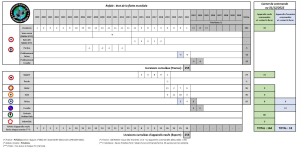Dassault Aviation boss: European defence depends on French industry
By Aurélie Pugnet and Théo Bourgery-Gonse | Euractiv.com 30 août 2023
French,Air,Force,Dassault,Rafale,Fighter,Plane,Taxiing,At,Mont-de-marsan [VanderWolf Images/Shutterstock]
The EU’s defence industry capabilities come down primarily to France’s six-decade nuclear dissuasion strategy that encouraged cutting-edge technological investments, Dassault Aviation CEO, Eric Trappier, said on Tuesday (29 August).
As Russia’s war in Ukraine brought questions of European defence and autonomy back to the fore, the EU is looking to secure greater levels of “strategic autonomy” – a term first coined in 2022 by French President Emmanuel Macron – in its critical sectors.
“[EU] defence industry capabilities lie first and foremost in France,” Trappier said at the French business association MEDEF’s annual meeting on Tuesday.
To the French company, the producer of Rafale fighter jets, achieving a higher degree of independence on defence matters involves acknowledging the technological and industrial superiority of France in the EU when it comes to producing cutting-edge defence material.
“The growth [of the defence industry] must be based on [member states’] technical capabilities, and not exclusively on cooperation opportunities [between like-minded countries],” Trappier, the former President of ASD (the European Aerospace, Security and Defence Industries Association), said.
Strategic autonomy, according to Trappier, was driven by France over the course of the past six decades, ever since the country gained access to nuclear weaponry under then-President Charles De Gaulle.
Nuclear dissuasion has helped “develop a defence and technology industrial base” specific to France, with economic actors across the country having built advanced expertise, he explained.
France’s new defence bill, adopted over the summer, increased the country’s national defence budget to €413 billion for the 2024-2030 period, including €50 billion extra for nuclear deterrence only.
Evidence of greediness
France has been criticised by other EU member states in Brussels for pushing an EU defence cooperation agenda that would largely benefit its own interests.Paris often accounts for the highest number of participating companies in European Defence Fund (EDF) projects and pilot programmes, which boost technological research and development and win over the largest projects – a fact that some smaller member states and companies have attributed to evidence of greediness, EURACTIV understands.
In 2021, a total of 178 French companies were selected for the projects. Italy came in close second with 156, followed by Spain and Germany.
In 2022, the French-led company MBDA was granted a €70 million project to work on hypersonic missile defence. This move was seen as a “fancy consolation prize” among the European defence industries, following intense lobbying from Paris, two people told EURACTIV under condition of anonymity.
The previous year, MBDA had not been selected to develop a European hypersonic defence interceptor as it failed to convince the European Commission it was the best fit. The Commission instead sided with the much smaller and less experienced Spanish arms maker SENER.
Buy European?
Ultimately, any level of European independence on defence matters is so closely linked to France’s ability to develop, grow and export its military expertise, and ensure its own independence is preserved, Trappier said.“Don’t give up what we already have for something far less certain,” the businessman said, in reference to the hypothetical idea of a pan-European defence force. Any future EU cooperation must “preserve” French industrial competencies, Trappier said.
“Peace is ensured through our ability to wage war. To prepare for war, it is not enough to enter into an ‘economy of war’: you must be in [it] in times of peace [as well],” he added.
The first relevant step could be to start buying European, especially when it comes to air defence. Dassault Aviation’s Rafale jets compete on the global stage against US competitor Lockheed Martin’s F-35s – which struck deals with a number of EU member states, such as Germany and Finland.
“Europe has spent €60 billion to buy F-35s, which is a shame,” Trappied said. “Why don’t EU [countries] buy French planes?” he asked.
Paul Maurice, a researcher at the French Institute of International Relations in Paris, told DW in March 2022: “The F-35 is understood here as a symbol of US power within NATO. After all the speeches about European autonomy and sovereignty, one had expected Germany to be more aligned with a European arms policy.”
US-France cooperation
As for cooperation with US counterparts, nothing’s ruled out, Dassault’s boss said. “Why not?” he teased.If this means falling under the catch of the US export control regime however, then it’s a no-go, he said, speaking alongside Amy Schedlbauer, Minister Counsellor for Economic Affairs at the US embassy in Paris.
“We need exports to have a viable industrial economic base, and US export controls would hinder those,” Trappier said.
Schedlbauer responded: “If there was further US-French cooperation in the defence sector, there would continue to be tweaked to that export control regime to reflect that partnership.”
Asked whether there was an appetite to create joining military technologies, such as a US-French fighter jet, Trappier slowly shook his head in the negative.










